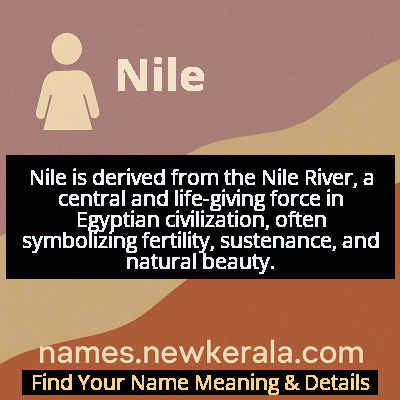Nile Name Meaning & Details
Origin, Popularity, Numerology Analysis & Name Meaning of Nile
Discover the origin, meaning, and cultural significance of the name NILE. Delve into its historical roots and explore the lasting impact it has had on communities and traditions.
Name
Nile
Gender
Female
Origin
Egyptian
Lucky Number
4
Meaning of the Name - Nile
Nile is derived from the Nile River, a central and life-giving force in Egyptian civilization, often symbolizing fertility, sustenance, and natural beauty.
Nile - Complete Numerology Analysis
Your Numerology Number
Based on Pythagorean Numerology System
Ruling Planet
Uranus (Rahu)
Positive Nature
Strong sense of order, loyal, practical, and disciplined.
Negative Traits
Stubborn, overly serious, rigid, and prone to feeling restricted.
Lucky Colours
Blue, gray.
Lucky Days
Saturday.
Lucky Stones
Blue sapphire.
Harmony Numbers
1, 7, 8.
Best Suited Professions
Managers, engineers, accountants, organizers.
What People Like About You
Dependability, discipline, practicality.
Famous People Named Nile
Nile Rodgers
Musician and Producer
Grammy-winning guitarist, songwriter and producer known for work with Chic, Madonna, and David Bowie
Nile Wilson
Gymnast
British artistic gymnast who won bronze at the 2016 Olympics and multiple Commonwealth Games medals
Nile Kinnick
American Football Player
Heisman Trophy winner in 1939 and University of Iowa football legend
Name Variations & International Equivalents
Click on blue names to explore their detailed meanings. Gray names with will be available soon.
Cultural & Historical Significance
This connection to sustenance, renewal, and cyclical abundance gives the name deep historical weight. The Nile was so central to Egyptian life that their calendar was based on its flooding cycles, and their entire agricultural system depended on its predictable rhythms. In modern times, the name evokes images of flowing water, ancient mysteries, and the cradle of civilization, connecting bearers to one of humanity's most enduring and influential cultural legacies. The river continues to be vital to modern Egypt, supporting over 95% of the population who live within a few miles of its banks.
Extended Personality Analysis
Individuals named Nile are often perceived as calm, deep, and life-giving personalities, much like the river itself. They tend to be nurturing figures who support others emotionally and practically, creating fertile ground for growth and development in their relationships and communities. Their steady, reliable nature makes them excellent friends and partners, though they may have hidden depths and currents that aren't immediately apparent. Niles typically possess strong intuition and emotional intelligence, allowing them to navigate complex social situations with grace.
These individuals often display a natural curiosity about history, philosophy, and the mysteries of human existence. They're frequently drawn to creative pursuits or helping professions where they can channel their nurturing energy. While generally peaceful and accommodating, Niles can demonstrate surprising strength and determination when their core values are threatened. Their combination of depth and approachability makes them sought-after confidants and advisors, though they may need to guard against taking on too much emotional responsibility for others.
Modern Usage & Popularity
In contemporary naming practices, Nile remains a distinctive choice that appeals to parents seeking nature-inspired names with historical resonance. While traditionally more common for boys, its usage for girls has been gradually increasing, reflecting broader trends toward gender-neutral naming. The name ranks consistently outside the top 1000 names in the United States and similar positions in other English-speaking countries, ensuring its distinctive quality. Its appeal spans multiple demographics—from history enthusiasts drawn to its Egyptian connections to environmentalists appreciating its natural imagery and minimalists liking its simple, strong sound. The name's international recognizability and easy pronunciation across languages contribute to its steady, if modest, popularity. Recent years have seen a slight uptick in usage, possibly influenced by growing interest in unique geographical names and ancient cultural references in baby naming.
Symbolic & Spiritual Meanings
The name Nile embodies rich symbolic meanings that extend far beyond its geographical origins. Primarily, it represents the life force itself—the essential element that transforms barren landscapes into thriving ecosystems. This symbolism connects to concepts of fertility, abundance, and sustenance across physical, emotional, and spiritual dimensions. The river's annual flooding cycle makes it a powerful symbol of renewal, regeneration, and the eternal return—the natural world's promise that life will continue despite challenges and droughts.
Metaphorically, the Nile represents journey and destiny, flowing inevitably toward its conclusion while nourishing everything along its path. It symbolizes hidden depths—the idea that calm surfaces often conceal powerful currents and ancient secrets. In psychological terms, the name suggests emotional richness, the ability to adapt while maintaining core identity, and the capacity to bring life and growth to seemingly hopeless situations. The duality of the Nile—both dividing and uniting Upper and Lower Egypt—also makes it a symbol of integration, representing the reconciliation of opposites and the harmonious flow between different states of being.

